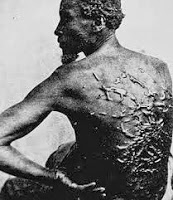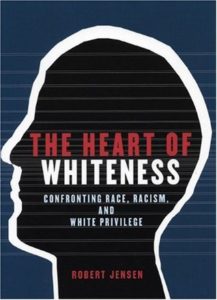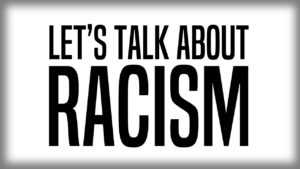This is the fourth in a series of postings where I share some thoughts on how to talk with the whites in our families, workplaces, organizations and social networks about the difficult topic of race. I don’t claim to be an “expert” on the topic, but rather am one simply sharing what I have learned over the years. As such I hope that this and other postings can provide some helpful guidance and meaningful dialogue both on and offline.
In my last entry I began to discuss some of the common statements white folks make when the topics of race and racism come up in conversation. I said that these statements are most often made in an attempt to either explain or defend a person’s current attitudes and/or inaction on issues and concerns related to race. I discussed three common responses: the claim to “not see race (i.e. colorblindness), the objection to the idea that whites in U.S. society have some sort of privilege, and innocence by association, the idea that one can’t possibly be racist because he/he has friends or co-workers who are persons of color. In this entry I want to continue looking at common things white folks say about the topic of race by discussing the following: claims to historical innocence, the charge of “reverse racism, and the assertion that by bringing up race one is trying to make white folks feel guilty for something they did not do.
Claims of Historical Innocence
For many years I took comfort during discussions on race in the fact that my ancestors were Northerners, and therefore (I thought) did not participate in the African slave trade. I took even further solace when I did some genealogy work and learned that two of my ancestors from Ohio played a small role in the Underground Railroad, helping runaway slaves make their way north to Canada to escape slave catchers from Southern states. However, in more recent years I have come to realize how shallow and misguided that comfort was, for whether my ancestors owned slaves or not, they benefited greatly by its presence. My false comfort only served to reveal my ignorance of the true (but generally and largely under-acknowledged) history of this country.
First, depending on how early in U.S. history one’s ancestors came to these shores, northern states also had legalized slavery. Vermont was the earliest colony to abolish slavery in 1777. Several other northern colonies – Pennsylvania, New Hampshire, Massachusetts, Connecticut, and Rhode island – abolished slavery in the 1780’s. New York abolished slavery in 1799 and New Jersey in 1804. However, by that time slavery had been legally practiced for over 175 years! Slavery was the law of the land and widely supported by civic and religious groups. In my book White Allies in the Struggle for Racial Justice, I tell the story of John Woolman, a Quaker who traveled up and down the East Coast in the early 1700’s attempting to convince Quakers to free their slaves, which they began to do in the 1750’s, but that was still 130 years after its inception. So not matter how we cut it, slavery was alive and well everywhere and with every sort of group for the first quarter of U.S. history.
However, even if one’s family did not benefit directly from slavery, there were several indirect benefits. Most of the cotton that slaves picked in the South was shipped to textile and clothing factories in the North, so that major northern industries and consumers benefitted by the free forced labor provided by slaves. In fact one cannot account for the rapid economic growth of the United States without accounting for millions of slaves providing a major portion of the labor that picked the cotton, worked the farms and built buildings, including the White House. Then, even after Emancipation and passage of the 13th and 14th Amendments, thru sharecropping, Jim Crow legislation, and other unjust labor practices, black folks were not fully compensated for their labor, nor provided the opportunities for advancement that Europeans enjoyed. People arriving to the U.S. shores from various European countries certainly had to struggle, and many faced discrimination, but compared to the 400-year history of slavery, Jim Crow, and institutional racism faced by people of African descent, there is no comparison. Whites who want to claim historical innocence as I did, need to explore history more fully to see the error of their assumptions.
Not only that, but in addition to the indignities foisted historically on people of African descent, all Europeans have benefited from the near-genocide committed against the indigenous people of this land. European advancement from the Eastern to Western shores only happened by wiping out and/or removing whole tribal groups from lands Europeans forcibly stole. Furthermore, groups like the Puritans used religion as a justification for treating native peoples as less than human. Manifest Destiny policies of the early 1800’s displaced many Mexican people in what is now the Southwest section of the country. So whites, however we try to cut, have no claim to historical innocence, only historical ignorance. Being white came with the reality of directly and indirectly benefiting by the suffering of others.
“Reverse Racism”
Since the 1960’s and the passage of affirmative action laws and policies, whites have sometimes taken to making charges of “reverse racism,” the idea that such policies and practices unfairly discriminate against qualified whites seeking employment or admissions to schools. This charge has gained political traction with the recent announcement by Attorney General Jeff Sessions that the Trump administration will begin “investigating and suing universities over affirmative action admissions policies deemed to discriminate against white applicants.” . Moreover, with the rise of groups like Black Lives Matter, whites claim that such groups are “anti-white” and guilty of “racism against whites.” ( I will address these reactions to BLM in my next posting). Like the claim to historical innocence, the charge of reverse racism betrays an unconscious or willful ignorance of historical precedents for affirmative action policies, and more importantly ignorance of the privileged historical position afforded the vast majority of white people.
 Affirmative Action policies were put in place to ensure that applicants for employment or admission to schools were not discriminated against because of race, religion, gender and national origin. Prior to the passage of these laws, such discriminatory practices were routinely and openly practiced. My own university, Duke, did not admit black persons as undergraduates until the mid-1960’s. Jews were forbidden from admissions to elite colleges like Harvard, Yale and Princeton . Practices like redlining and denial of certain GI benefits to black veterans limited where families of color could live and work. Even after anti-discrimination laws were passed, such practices were continued thru informal networks, which limited the ability of persons of color or women to gain access to various positions or opportunities. All through this time, whites faced no such barriers.
Affirmative Action policies were put in place to ensure that applicants for employment or admission to schools were not discriminated against because of race, religion, gender and national origin. Prior to the passage of these laws, such discriminatory practices were routinely and openly practiced. My own university, Duke, did not admit black persons as undergraduates until the mid-1960’s. Jews were forbidden from admissions to elite colleges like Harvard, Yale and Princeton . Practices like redlining and denial of certain GI benefits to black veterans limited where families of color could live and work. Even after anti-discrimination laws were passed, such practices were continued thru informal networks, which limited the ability of persons of color or women to gain access to various positions or opportunities. All through this time, whites faced no such barriers.
This leads to my second point. When anti-discrimination policies and practices were implemented, and the playing field, so to speak, was somewhat levelled, whites had competition and factors facing them they had previously been unaware of. Their safe and secure position atop the social hierarchy was somewhat shaken. Moreover, when people of color assert their rights to fair treatment, whites feel their assumptions threatened about America’s commitment to fairness and justice.
More insidious is that often political and corporate leaders exploit this new tension to their advantage by pitting white folks and people of color against one another to keep wages low and to maintain greater control. This practice, often called “divide and rule” has been used by powerful whites almost from the beginning of this country’s history, when wealthy landowners pitted white indentured servants against African slaves to keep the two groups from joining forces to fight better working conditions and treatment from their landowner employers/masters. In the recent election, many low income whites were led to by political leaders to believe that their economic struggles were due to the presence of so many undocumented immigrants, when no valid research supports such a claim.
To provide opportunities where opportunities did not previously exist, and to bring greater racial balance to a workplace, university classroom, or a society in general attempts to right past wrongs. Those who claim “reverse racism” assume they are not admitted or hired because of race, when in fact an equally qualified person of color simply was hired or admitted. Whites would not cry “foul” if an equally qualified white person was their competition; the charge of “reverse racism” is just a diversion that has been used for centuries to avert attention from larger issues at play.
White Guilt
Finally, when discussions of race and racism come up, white folks often experience guilt, and at times they will charge the other person of “trying to make me feel guilty for something I did not do.” Another version of this response is for someone claiming that the speaker is “calling me a racist” by simply bringing up racist dimensions of our behaviors, institutions, and society in general. Guilt (“I did something bad”) can sometimes lead to a more global feeling of shame (I am a bad person). That guilt and shame can sometimes lead to defensive anger. The phenomenon of white guilt is something I will discuss in more depth in a later blog entry. However, let me make a few comments here.
In our conversations with white folks about race issues, we need to own our own struggles with racism and avoid finger pointing. This is why I began this series by saying in any conversation talking with folks about race we must start with ourselves. That being said, the very topic of race has the capacity to stir up deep feelings of guilt, shame, and anger. I have had people get angry at me, accuse me of all sorts of things, and even threaten me physically (Fortunately, I am a pretty big guy, so that never went anywhere). These reactions are to be expected when the topic of race arises.
However, no one can MAKE another person feel guilty. Guilt is a natural emotional reaction to moral and ethical issues. When we realize the depth to which racism has embedded itself in our society, it is hard for a thinking, conscientious person NOT to feel guilty. Guilt alerts us to something that is wrong, something that requires a response, something prodding us to action. Despite our culture’s insistence that people should never have to feel guilty, guilt and shame moves people to action. Without guilt and shame, alcoholics might never seek treatment, abusers might never try to change their ways, and corrupt leaders might never come to terms with the ways they have manipulated and used people. Without guilt and shame, whites caught in the web of racism might never try to work to undo the system that has imprisoned us all in different ways.
If someone says I am trying to make them feel guilty, I don’t take responsibility for their feelings, but I do ask questions like: Where does the guilt come from? What is that guilt trying to tell you? What are you going to do about it? Guilt is a good thing because it says we have a conscience, it calls us to look at ourselves and consider the ways our thinking and actions need to change.
This is Hard Work
The responses of historical innocence, reverse racism, and white guilt are deeply embedded in our culture, and are not easy to address. Generally speaking, North Americans tend to have a short historical memory. People generally don’t know and don’t want to know what happened in the past and how it relates to the present. We don’t recognize that where we are today is a result of where we have come from historically. Thus, addressing the responses discussed in this entry are often difficult, drawn out, and frustrating. We ourselves may have to spend time learning that history in order to fully grasp its impact. There are a wealth of books and films that address various aspects of the history of racism, and can help us make the connections. Space does not allow me to list all the resources that I have found helpful over the years, but a visit to most libraries or book stores will get one started. If nothing else, these difficult conversations can move us to become more aware, better educated, and increasingly conscious of the insidious ways racism has been woven thru our history and still impacts our present situation.


I was a former colleague of Drick’s for 11 years and saw racial preferences openly practiced in both undergraduate admissions and faculty/staff hiring. Indeed, racially biased policies and practices euphemistically titled “affirmative action” or “diversity initiatives” are alive and well in higher education. So I disagree with Drick that “Those who claim ‘reverse racism’ assume they are not admitted or hired because of race, when in fact an equally qualified person of color simply was hired or admitted.” The data I’ve seen simply doesn’t support that claim and instead shows that less qualified minorities are being admitted and hired (see the last several Supreme Court cases on this where universities openly defend such practices). The pendulum has simply swing from white privilege to minority privilege; I regard both as unjust and agree with Chief Justice John Roberts that “The way to stop discrimination on the basis of race is to stop discriminating on the basis of race.”
Andy – not having been a part of the undergraduate admissions process, can’t comment on your assertion that “racially biased policies and practices euphemistically titled “affirmative action” or “diversity initiatives” existed in admissions, so I have sent it to our Director of Admissions for comment. As for such policies leading to the hiring of “less qualified minorities,” I would only point out there were and are many less than qualified whites at the institution as well. So often we forget that whites have had affirmative action for centuries and the more recent policies are a correction and not “reverse racism” as you contend
And I should have been more specific- I have seen racial preferences in higher education hiring firsthand, but my comments about student admissions are more reflection of practices across the nation as opposed to anything I saw directly at our institution.
Andy – I have no knowledge of the admissions process and so I have forwarded your comment to the Director of Admissions for his perspective related to the institution’s admissions policies and practices. As for hiring “less qualified minorities” I would only say that in my 20 years at the institutions there were and are many less than qualified whies as well. Whites have enjoyed affirmative action policies for centuries in this country, and the more recent efforts are meant to be a correction to level what was a deeply unfair playing field. To correct is not “reverse racism.”
Appreciate the response Drick. I don’t disagree that whites have enjoyed privileged status in years past, but the current affirmative action/diversity policies go beyond leveling the playing field to tilting it in favor of minority applicants. This is openly practiced in higher education and I think the justification amounts to two wrongs making a right. Mismatch by Sander and Taylor makes the case that the current system harms the students it intends to help.
And my comment about hiring “less qualified minorities” was in comparison to other candidates being considered (of course there are unqualified people of all races currently employed). I am thinking of faculty searches where it was acknowledged at the outset that the department had to bring a minority scholar on board. I’ve seen lots of discussion on this phenomenon online at Chron of Higher Ed. Again, racial preferences under the cloak of “diversity” is simply unfairness or injustice in the opposite direction.
Andy – I contacted the Admissions Department and University officials assure me that the institution has no race-based admissions policy. So I am not sure what you were to in terms of admissions. Perhaps it was your perception, but it certainly is not policy.
See my clarification above
Sorry for the repitition – I didn’t know the first iteration of this comment went through